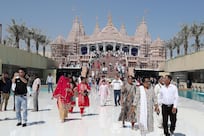RAS AL KHAIMAH // "Ice and penguins are the last thing you expect to see in the desert," laughed Cheryl Apas, as she stood in the looming shadow of a large emperor penguin. Surrounded by huge igloos and plastic ice and snow, hundreds of the emirate's residents turned out last night for a first glimpse of the Dh100 million Ice Land Water Park.
Members of the emirate's Ruling Family joined the crowds for the official opening ceremony. Dressed in traditional white khandouras and niqabs, people thronged the park, which tourism officials hope will draw thousands of visitors to the emirate. Youngsters raced around the 50-hectare site, which opened its door to the public yesterday and can accommodate 10,000 guests at one time. The park features 37 slides and Penguin Falls, the world's largest man-made waterfall, which is 37 metres tall and 165 metres wide.
"I think it's just amazing," added Ms Apas, 32, a customer-service assistant from the Philippines who lives in RAK. "I think it's a great idea to have a water park in the middle of the desert." Omaimah Ali, 16, a Pakistani who lives with her family in the emirate, said visiting the park is the closest she has ever come to seeing snow. "I think it's wonderful," said Mahmoud Abu Ali, the acting director of tourism promotion with the RAK Department of Economic Development. "This is something else we can offer tourists, an amusement."
But numbers and official enthusiasm alone cannot tell the entire story. The residents of Jazirat al Hamra had watched as the park's white mountains rose above the town for months, anticipating the wonders on the other side of Ice Land's snowy peaks. However, earlier this month the white peaks had turned a bleached grey and were covered with the fine red sand that gave the village below its name: Jazirat al Hamra translates into "the red island".
The coastal village is quiet and staid, in marked contrast to the bustling water park operating next to it. Jazirat al Hamra is home to the sons and daughters of mariners who have lost their access to the RAK coastline to ambitious residential and tourist developments during the last seven years. On Ice Land's opening night, most of the villagers lined up at the entrances to the park, wanting to see the chilly wonders that awaited them beneath the gleaming red roofs of European-style chalets.
"Most people like it, and they have been waiting a long time," said Shayma al Zaabi, 23, a business and information technology graduate of the Higher Colleges of Technology. "When I finish my work I will go, sure. Inshallah, Friday will be for families. We like the water too much in the summer because the weather is too much hot." Though renowned as mariners, the people of Jazirat al Hamra are also known for their date gardens, which are situated in the mountainous region of Khatt, a few kilometres inland. Adequate irrigation has been a constant worry for the farmers, said men from the village, but the large amounts of water that will be needed to operate Ice Land - all of it desalinated - is not expected to detrimentally affect their crops.
"That is a sweet [ground] water problem, and that is from the sea," said Sultan Ahmed, 55, referring to the water that will be used at the park. "Water is a problem for my farm for 10 or 20 years; it's salty and the water level has dropped. But this [park water] is from the sea. It is no problem for my farm in Khatt." The opening night of Ice Land provided low-wage workers like Sujan Aich a chance to see what life was like on the other side of RAK's newest mountain, and he hoped that park officials would in future waive entrance fees for special occasions.
"Maybe all my friends will come from Dubai," said the 27-year-old Bangladeshi. "This is my chance to go and see it. The outside has penguins. It's too much nice." Bangladeshi fishermen relaxing under neem trees and palm-frond shelters yesterday afternoon said they would also try their luck. "The ticket's a lot of money," said Lulitman Dash, 35, a fishermen who has worked in RAK for 10 years and earns about Dh600 a month. His catches have dropped from as much as 100kg of fish per trip to as little as 20kg, but he remained optimistic that the park and other projects would not hurt his trade.
Ahmed Ismail, 19, a professional footballer with the Al Wasl Club in Dubai, who is from Jazirat al Hamra, hoped to try his skills under the spray of giant sprinklers on the water-soaked plastic aqua field. "Jazirat al Hamra is an old village and it doesn't have things like this," said Mr Ismail. "More people will come here and it will be good for us."





